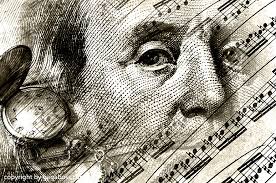I recently organized and moderated two music panels at the Digital Hollywood conference, showcasing the views and expertise of eleven professionals from virtually all aspects of the contemporary digital music business. There were two panels with two discussions (music & YouTube; music and social), but truthfully, this is an ongoing conversation in which music is the canary in the coal mine – trends we see now in music are trends we’ll see throughout the digital media ecosystem.
Many thanks to the panelists, listed below, for their enthusiastic and frank discussions, and apologies that I don’t have direct quotes for attribution. I was busy moderating :) Here’s some of what they said:
 The “traditional” music business has collapsed – meaning consumers spend dramatically less on recorded music today than they did at the peak of the business --- whether it’s CDs, downloads, or subscriptions to streaming services. And yet, the ecosystem survives, with money flowing from more sources to more participants.
The “traditional” music business has collapsed – meaning consumers spend dramatically less on recorded music today than they did at the peak of the business --- whether it’s CDs, downloads, or subscriptions to streaming services. And yet, the ecosystem survives, with money flowing from more sources to more participants.
This was and still is a blockbuster business, with a disproportionate share of the revenue going to the most popular artists. In some ways, the “network effect” has cemented this reality even more than the old days when radio ruled (which, by the way, it still does, sort of).
There are only 300,000 songs that make any money, and 20+ million songs that don’t. That “long tail” can be monetized, but it takes focus and innovation to do so (and one of our panelists has a company that is doing just that). With the cost of production so low, professional musicians now compete with millions of amateur tracks.
We are in the era of music discovery, but most people don't really want to discover anything new. Socially connected apps and streaming services providing many new ways for consumers to sample new artists. And yet, statistically, in the blockbuster music economy, we find that most people don’t actually want to discovery new music. They want to listen to the music that everyone else is listening to.
Now that Everyone (including you) is a brand, all that seems to matter is the size of your audience. Emerging artists are increasingly required to conduct their lives as if they were a commercial brand – connecting with consumers on many different social platforms, and providing content (video, posts, images) well outside the creation and distribution of the music itself, in order to accumulate fans. Partnerships and additional opportunities are now determined at least as much by fan metrics as the music itself. (Ouch!)
Brand partnerships is perhaps the fastest growing source of revenue for artists, with many examples of relatively non-intrusive sponsorships of artists, music, and events emerging. Brands want the cool factor. And they want the exposure potential of the artists’ fan bases.
Social Media Platforms are the Banks; Engagement is the Currency. The savvy artist understands that the levers of their career (building a team, getting a record deal, booking gigs and tours, etc.) depend upon how much currency, e.g., fan engagement they have. In some cases, that is literal currency, because there are numerous ways to purchase fan-count and fan-engagement.
Careers can be made in A Single Event. A tune on a social platform like YouTube (or now Vine, Instagram, Snapchat) can go viral, and sometimes all it takes is attention from somebody with a huge fan base. From Justin Bieber to Shawn Mendes, talent
Radio exposure is still important for an artist, and is one of the best things a record label can get for talent.
Very few people have bad things to say about YouTube, at least in public. Google’s massive video site provides free distribution for every artist, and therefore has the most comprehensive library of music content --- mainstream and niche. Millions of people, especially millennials, use YouTube as their audio streaming service. It’s pending launch of a paid subscription service may be bad news for the Spotify's and Pandora's of the world.
Tidal Will Fail. The high-fidelity music subscription service launched by JayZ and a bevy of blockbuster artists are swimming against the tide, and, our panelists uniformly predict it will not survive. Most of the panelists thought that Apple’s new streaming service, without the “Beats” name, would be one of the survivors, because of its hardware.
Music is inextricably tied to the tech economy, which is why the battle will be slugged out between tech giants like Apple, Google, Amazon, Facebook, etc – these companies are fighting versions of this same fight over video, television, books, and much more.
Thanks to my speakers: Take a look at their sites to find out where the business is going.
- Doug McVehil, Head of Content & Programming, Vevo
- Jeff Daniel, CEO/co-founder, Starmaker Interactive
- Daniel Rosen, Senior Music Talent Manager, Fullscreen
- Ryan Tomlinson, President, SKEEmatic; Exec. Producer, SKEE TV
- Dana Shayegan, Vice President of Music, Collective Digital Studio (CDS)
- Brad Sphar, Vice President, Sony Music
- Heiko Schmidt, CEO, Parasongs
- Rami Perlman, VP Music Talent & Influencers, theAudience
- Anthony Shannon, Cofounder & CEO, TuneStars
- Ian Roberts, Cofounder & CEO, Hive
- Damian Hagger, co-founder/Marketing Director, SixString.com